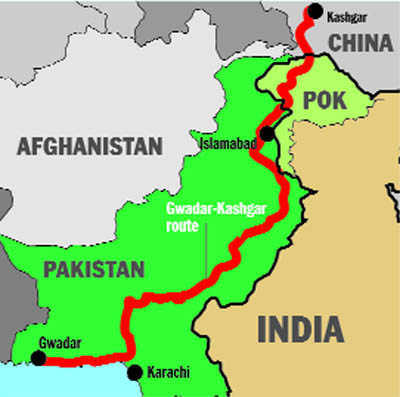International Relations
Extension of CPEC to Afghanistan
- 30 Sep 2021
- 5 min read
Why in News
Recently, Pakistan has discussed Taliban-led Afghanistan joining the multibillion-dollar China-Pakistan Economic Corridor (CPEC) infrastructure project.
- China has proposed construction of the Peshawar-Kabul motorway as an extension of CPEC in Afghanistan.
- Taliban takeover of Afghanistan and China emerging as a major challenge in the form of the extension of its ambitious CPEC, has raised India’s concerns on economic, political and security fronts.
Key Points
- China-Pakistan Economic Corridor:
- The CPEC is a bilateral project between Pakistan and China.
- It is intended to promote connectivity across Pakistan with a network of highways, railways, and pipelines accompanied by energy, industrial, and other infrastructure development projects.
- It aims to link the Western part of China (Xinjiang province) to the Gwadar Port in Balochistan, Pakistan via Khunjerab Pass in the Northern Parts of Pakistan.
- It will pave the way for China to access the Middle East and Africa from Gwadar Port, enabling China to access the Indian Ocean.
- CPEC is a part of the Belt and Road Initiative. The BRI, launched in 2013, aims to link Southeast Asia, Central Asia, the Gulf region, Africa and Europe with a network of land and sea routes.
- India has been severely critical of the CPEC, as it passes through Pakistan-occupied Kashmir, which is a disputed territory between India and Pakistan.
- Implications of Afghanistan Joining CPEC on India:
- Filling the Void: In Afghanistan, China is trying to fill the vacuum created after the US forces left Afghanistan economically and gets its Belt and Road (BRI) initiatives going.
- Undermining Chabahar Port: The foremost concern with Afghanistan joining CPEC is that India is apprehensive of its investment in Chabahar port in Iran.
- India is wary of undermining the India–Iran–Afghanistan trilateral that gives Afghanistan access to sea via Chabahar port.
- Weakening of India’s Economic Influence: Attempts to extend CPEC to Afghanistan may undermine India’s position as economic, security and strategic partner of Afghanistan.
- India has been the biggest regional donor to Afghanistan committing more than US$2 billion for the developmental work that includes construction of roads, power plants, dams, parliament building, rural development, education, infrastructure and much more.
- With Extension of CPEC, China will play a leading role in Afghanistan overpowering India’s economic influence in Afghanistan.
- Terrorism and Strategic Concerns: Given India’s limited strategic depth in Afghanistan, China is in better position to leverage its strategic advantages in Afghanistan.
- Further, Afghanistan’s inclusion in the CPEC will definitely help in the economic development, but it will also help Pakistan gain the strategic advantage and upper hand in Afghanistan at the cost of India.
- In this situation, Pakistan may augment use of terrorism against India.
- Control of Strategic Air Base: Besides its issues with the CPEC, India will be wary of the likelihood that China may try to take over the Bagram air force base in Afghanistan.
- The Bagram airport is the biggest airport and technically well-equipped as the Americans kept it for their use till the end, instead of the Kabul airport.
- Exploitation of Rare Earth Minerals: With the extension of CPEC, China is also looking to exploit Afghanistan's rich minerals and highly lucrative rare-earth mines.
- Rare-earth metals, which are key components for a host of advanced electronic technologies and hi-tech missile guidance systems.
Way Forward
- For the success of CPEC in Afghanistan and to a large extent in Pakistan’s troublesome territories, it becomes imperative for China to stabilise the security situation in the region.
- Improved infrastructure and security situation in Afghanistan may help India to conduct its economic and trade activities in a smoother way.
- However, given the hostility of China, Pakistan and Taliban against India, Afghanistan joining CPEC will certainly be a strategic advantage for China and a loss for India.





